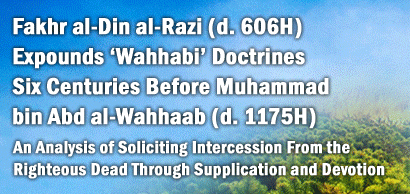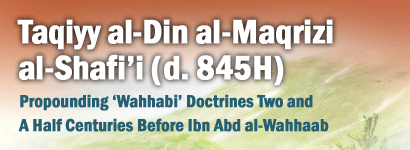| Thursday, 08 January 2026 |
|
|
|
You are here:
Home  General
General

That which is spread by the dishonest contemporary Sufis is that Muhammad bin Abd al-Wahhaab (rahimahullaah) and those with him dismissed all previous scholarly heritage, reviled the forerunners, and scrapped their books, said it is prohibited to look at them, and made themselves the only scholarly authority. That is animal fodder purchased and consumed only by the dumbwitted, and is simply another piece in the propaganda jigsaw used to malign the monotheistic call of Muhammad bin Abd al-Wahhaab and those with him. Here we present a statement from Shaykh Abd Allaah bin Muhammad bin Abd al-Wahhaab on the books and scholarly authorities which the Scholars of the Unitarian movement relied upon in matters of religion. He said, as occurs in al-Durar al-Saniyyah (1/228-229):
ثم إنا نستعين على فهم كتاب الله، بالتفاسير المتداولة المعتبرة، ومن أجلها لدينا : تفسير ابن جرير، ومختصره لابن كثير الشافعي، وكذا البغوي، والبيضاوي، والخازن، والحداد، والجلالين، وغيرهم . وعلى فهم الحديث، بشروح الأئمة المبرزين : كالعسقلاني، والقسطلاني، على البخاري، والنووي على مسلم، والمناوي على الجامع الصغير . ونحرص على كتب الحديث، خصوصاً : الأمهات الست، وشروحها ؛ ونعتني بسائر الكتب، في سائر الفنون، أصولاً، وفروعاً، وقواعد، وسيراً، ونحواً، وصرفاً، وجميع علوم الأمة . ولا نأمر باتلاف شيء من المؤلفات أصلاً، إلاّ ما اشتمل على ما يوقع الناس في الشرك، كروض الرياحين، أو يحصل بسببه خلل في العقائد، كعلم المنطق، فإنه قد حرمه جمع من العلماء، على أنا لا نفحص عن مثل ذلك، وكالدلائل، إلاّ إن تظاهر به صاحبه معانداً، أتلف عليه ؛ وما اتفق لبعض البدو، في اتلاف بعض كتب أهل الطائف، إنما صدر منه لجهله، وقد زجر هو، وغيره عن مثل ذلك .
Comments
Firstly, note that the Shaykh mentioned some of the books of those who had something of I'tizaal and something of departure from the creed of the Salaf (in the books of tafseer), alongside those books which are purely Salafi, Athari. And likewise reliance upon the books of those who had been influenced by the Mutakallimeen such as al-Nawawi and al-Asqalani and others. And the same can be said in all other disciplines. So this exposes the academic fraud of the contemporary Sufis who are very unjust and whose hatred and desires prevent them from being truthful about these Shaykhs. They never dismissed Islamic scholarl heritage, rather they valued it and benefited from it and prohibited that it be dismissed and shunned. Secondly, note also how they did not command the destruction of any of the heritage of the past Muslim scholars, even if they contained something of error, unless it comprises what leads the people to invalidation of their faith, or which are a means and avenue towards that or towards heresy. Thirdly, the freedom of these Shaykhs from a contemporary faction, the Haddaadiyyah, who prohibit the books of Ibn Hajar and al-Nawawi and others, and call for their destruction - this is not the position and view of Ahl al-Sunnah. And alhamdulillaah, the contemporary Scholars of Ahl al-Sunnah have spoken against them and their evil, and they are similar to those being alluded to at the end of the quote above.
Link to this article: Show: HTML Link • Full Link • Short Link
Add a Comment You must be registered and logged in to comment. |
|
||||||||||||||||
 |
 | |
|
|
 Thereafter, we seek aid in understanding the Book of Allaah with the well-circulated, accepted books of tafseer (Qur'anic commentary), and from the loftiest of them in our view are the tafseer of Ibn Jarir, and its summarized version by Ibn Kathir
Thereafter, we seek aid in understanding the Book of Allaah with the well-circulated, accepted books of tafseer (Qur'anic commentary), and from the loftiest of them in our view are the tafseer of Ibn Jarir, and its summarized version by Ibn Kathir 








